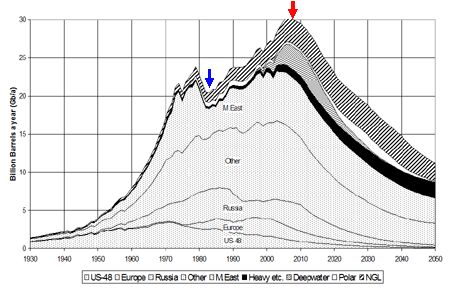German Govt. Study Warns Of Dire Post Peak-Oil Crisis: End Of Free Markets And Democracy

Here’s a cheery study on the effects of Peak Oil, which is widely considered to be happening…right about now (throw in a few more hours/months/years depending on how big of an optimist/denialist you are). Der Spiegel got their hands on a confidential study commissioned by the German military, which has not yet been sanitized approved for publication. It’s a bit explosive…might get the civilian population riled up and all. It warns of shifts in the global balance of power, the decline of importance of western nations (oil importers), as well as “the total collapse of the markets” and…gulp…even worse. Let’s go talk about 1970 Boss 302 Mustangs.
“The (German) leak has parallels with recent reports from the UK. Only last week the Guardian newspaper reported that the British Department of Energy and Climate Change (DECC) is keeping documents secret which show the UK government is far more concerned about an impending supply crisis than it cares to admit.According to the Guardian, the DECC, the Bank of England and the British Ministry of Defence are working alongside industry representatives to develop a crisis plan to deal with possible shortfalls in energy supply. Inquiries made by Britain’s so-called peak oil workshops to energy experts have been seen by SPIEGEL ONLINE. A DECC spokeswoman sought to play down the process, telling the Guardian the enquiries were “routine” and had no political implications.”
The German report assumes that Peak Oil is happening while we argue this point endlessly, and that the effects will “be felt 15 to 30 years later”. Here are the key points:
- Oil will determine power: The Bundeswehr Transformation Center writes that oil will become one decisive factor in determining the new landscape of international relations: “The relative importance of the oil-producing nations in the international system is growing. These nations are using the advantages resulting from this to expand the scope of their domestic and foreign policies and establish themselves as a new or resurgent regional, or in some cases even global leading powers.”
- Increasing importance of oil exporters: For importers of oil more competition for resources will mean an increase in the number of nations competing for favor with oil-producing nations. For the latter this opens up a window of opportunity which can be used to implement political, economic or ideological aims. As this window of time will only be open for a limited period, “this could result in a more aggressive assertion of national interests on the part of the oil-producing nations.”
- Politics in place of the market: The Bundeswehr Transformation Center expects that a supply crisis would roll back the liberalization of the energy market. “The proportion of oil traded on the global, freely accessible oil market will diminish as more oil is traded through bi-national contracts,” the study states. In the long run, the study goes on, the global oil market, will only be able to follow the laws of the free market in a restricted way. “Bilateral, conditioned supply agreements and privileged partnerships, such as those seen prior to the oil crises of the 1970s, will once again come to the fore.”
- Market failures: The authors paint a bleak picture of the consequences resulting from a shortage of petroleum. As the transportation of goods depends on crude oil, international trade could be subject to colossal tax hikes. “Shortages in the supply of vital goods could arise” as a result, for example in food supplies. Oil is used directly or indirectly in the production of 95 percent of all industrial goods. Price shocks could therefore be seen in almost any industry and throughout all stages of the industrial supply chain. “In the medium term the global economic system and every market-oriented national economy would collapse.”
- Relapse into planned economy: Since virtually all economic sectors rely heavily on oil, peak oil could lead to a “partial or complete failure of markets,” says the study. “A conceivable alternative would be government rationing and the allocation of important goods or the setting of production schedules and other short-term coercive measures to replace market-based mechanisms in times of crisis.”
- Global chain reaction: “A restructuring of oil supplies will not be equally possible in all regions before the onset of peak oil,” says the study. “It is likely that a large number of states will not be in a position to make the necessary investments in time,” or with “sufficient magnitude.” If there were economic crashes in some regions of the world, Germany could be affected. Germany would not escape the crises of other countries, because it’s so tightly integrated into the global economy.
The article makes the following prediction: oil importers like Germany will increasingly suck up to exporters like Russia, Saudi Arabia and Iran regardless of the effects on other countries (Israel, Eastern European countries, etc.), or other once-important moral or social imperatives, like…never mind. Shall we talk about the Nissan Leaf instead of the Mustang?

More by Paul Niedermeyer
Latest Car Reviews
Read moreLatest Product Reviews
Read moreRecent Comments
- Honda1 Unions were needed back in the early days, not needed know. There are plenty of rules and regulations and government agencies that keep companies in line. It's just a money grad and nothing more. Fain is a punk!
- 1995 SC If the necessary number of employees vote to unionize then yes, they should be unionized. That's how it works.
- Sobhuza Trooper That Dave Thomas fella sounds like the kind of twit who is oh-so-quick to tell us how easy and fun the bus is for any and all of your personal transportation needs. The time to get to and from the bus stop is never a concern. The time waiting for the bus is never a concern. The time waiting for a connection (if there is one) is never a concern. The weather is never a concern. Whatever you might be carrying or intend to purchase is never a concern. Nope, Boo Cars! Yeah Buses! Buses rule!Needless to say, these twits don't actual take the damn bus.
- MaintenanceCosts Nobody here seems to acknowledge that there are multiple use cases for cars.Some people spend all their time driving all over the country and need every mile and minute of time savings. ICE cars are better for them right now.Some people only drive locally and fly when they travel. For them, there's probably a range number that works, and they don't really need more. For the uses for which we use our EV, that would be around 150 miles. The other thing about a low range requirement is it can make 120V charging viable. If you don't drive more than an average of about 40 miles/day, you can probably get enough electrons through a wall outlet. We spent over two years charging our Bolt only through 120V, while our house was getting rebuilt, and never had an issue.Those are extremes. There are all sorts of use cases in between, which probably represent the majority of drivers. For some users, what's needed is more range. But I think for most users, what's needed is better charging. Retrofit apartment garages like Tim's with 240V outlets at every spot. Install more L3 chargers in supermarket parking lots and alongside gas stations. Make chargers that work like Tesla Superchargers as ubiquitous as gas stations, and EV charging will not be an issue for most users.
- MaintenanceCosts I don't have an opinion on whether any one plant unionizing is the right answer, but the employees sure need to have the right to organize. Unions or the credible threat of unionization are the only thing, history has proven, that can keep employers honest. Without it, we've seen over and over, the employers have complete power over the workers and feel free to exploit the workers however they see fit. (And don't tell me "oh, the workers can just leave" - in an oligopolistic industry, working conditions quickly converge, and there's not another employer right around the corner.)































Comments
Join the conversation
I'm not so sure about natural gas now. We had an explosion with a 1,000 foot fireball here last night. It was about 3 miles away from my home. We can still smell the smoke. At least one person killed, many injured, and 50 homes burned to the ground. The 30-inch high pressure gas main -- built in 1948 -- fed a fire shooting flames 60 feet in the air for 2 hours before they could shut it off. The neighborhood looks like a war zone.
What? And the explosion on the rig out in the Gulf with the resulting oil spill was better how? There are risks involved regardless of which form of energy is used. I take JohnHarris' approach here...oil is finite. Plain and simple. And yes, we (human beings) have accelerated changes to the world's ecology due to our immense use of said resources. That being said, a mix of numerous resources makes the most sense as we transition away from oil. I'm all for us reducing the dollars we send abroad to those countries that are less than friendly with us. My take on America has always been that we are typically slow to make a change until faced with an urgent need to do so...but when we do decide to get behind something, we tend to go all in. I guess I'm a hopeless optimist when it comes to this country...